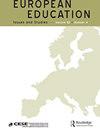通过PISA伪造教育?中国在PISA中的独特参与分析
IF 0.9
Q4 EDUCATION & EDUCATIONAL RESEARCH
引用次数: 7
摘要
摘要PISA允许比较,并有助于在国家之间分配某些类型的资本,这些资本转化为软实力。教育一直被认为是中国在全球地位和实力提升的重要支柱。然而,中国参与PISA的情况与其他国家不同,只有中国一些最富裕的地区参与,而不是整个国家。我们的研究通过分析中国和经合组织的话语,调查了中国在PISA中的独特参与及其政治含义。我们的研究结果表明,在中国参与PISA方面,当地机构和全球脚本之间存在相互交织的关系。本文章由计算机程序翻译,如有差异,请以英文原文为准。
Fabricating Education through PISA? An Analysis of the Distinct Participation of China in PISA
Abstract PISA allows for comparisons and contributes to the distribution of certain types of capital among countries, which is converted into soft power. Education has been considered an important pillar of the increased status and power China holds globally. However, Chinese participation in PISA differs from other countries, whereby only some of China’s wealthiest areas participate rather than the entire country. Our research investigates China’s distinct participation in PISA and its political implications through an analysis of the discourses of China and the OECD. Our findings point toward an intertwinement between local agency and global scripts regarding Chinese involvement in PISA.
求助全文
通过发布文献求助,成功后即可免费获取论文全文。
去求助
来源期刊

European Education
EDUCATION & EDUCATIONAL RESEARCH-
CiteScore
1.20
自引率
0.00%
发文量
5
期刊介绍:
uropean Education is published in association with the Comparative Education Society in Europe (CESE). It is an international peer-reviewed journal devoted to original inquiries and dialogue on education across the member states of the Council of Europe. Established in 1969, the journal features articles on education in individual member states, comparative studies on education across Europe, as well as the impact of European education initiatives globally. The journal especially encourages theoretical and empirical studies, interdisciplinary perspectives, and critical examination of the impact of political, economic, and social forces on education. European Education includes reviews of books and educational films, including those published/produced in English and other languages.
 求助内容:
求助内容: 应助结果提醒方式:
应助结果提醒方式:


